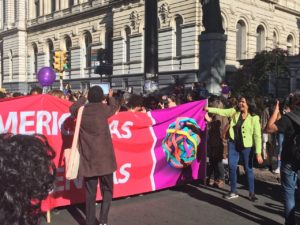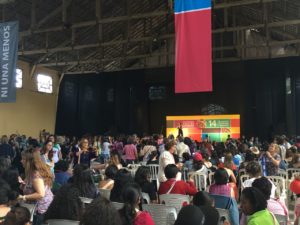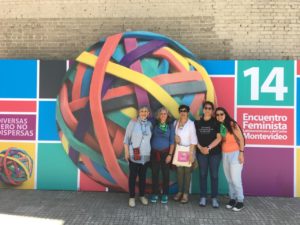With the contributions of Celita Eccher, María Graciela Cuervo and Flora Partenio. We are grateful for the contributions of Yandira Álvarez, Fernanda Carrizo, Claudia Ferreira and Marcela Mazzei.
From November 23 to 25, 2017, more than 2,200 women and feminists from 30 Latin American countries gathered for the first time in Montevideo, within the framework of the 14th Feminist Gathering of Latin America and the Caribbean (EFLAC) under the motto: Diverse but not divided. Feminists arrived with their different identities, colors, languages, flags and messages. EFLAC started to spread over the city. People met for the first time or reencountered after many years; ideas over projects were exchanged, new debates and perspectives were proposed or the revision of old practices and ways of organizing ourselves and rethinking as a political movement was proposed. It was a highly political gathering and very rich in terms of content.
The first feminist gathering in Latin America and the Caribbean was held in 1981 in Bogota, Colombia, thirty-six years ago, as a new, diverse and powerful gathering of feminists in the region. The choice of Uruguay to host the gathering is very meaningful. In first place, such gathering had not taken place in the Southern Cone for 20 years -the last one was in Chile, in 1996- which has made it impossible for women from this region to participate, due to the high airfares. At regional level, Uruguay is one of the countries showing more progress in terms of recognition of women’s rights.
EFLAC 14 takes place in a moment of great progress in the region, for example, the celebration of the quota law in Argentina. But Latin America is still the world’s most unequal region and is also going through “fierce” times, marked by debates on the formal and substantive equality, sustainable development and democracy. Feminists, in all their diversities, have not remain uninvolved in these debates.
From Mexico to Colombia, from Brazil to Suriname, we have seen the emergence of new and old movements that have been connecting and claiming the complexity and multiple dimensions of these inequalities. The following events compose the new “normality” in our region: recent persecutions of feminists accused of imposing a “gender ideology”, the growing participation of religious fundamentalism in the way of doing politics of our States; the influence of corporate power in the development debates; the persecution, criminalization and murders of indigenous environmentalist activists and the attacks during mobilizations for democracy in Honduras and Brazil. In the face of this, the actions of the feminist and women’s movements on the streets are also powerful and this represents a feminist and women’s force, mobilized throughout the region, as a strong political phenomenon organized for a more just future for all in Latin America. EFLAC 14 confirms that, despite resistance and persecutions, a growing feminist movement persists and resists in Latin America. As Marisa Navarro puts it, EFLAC is not a trend, it has never been one.
The call for EFLAC stated that the objective of the Montevideo gathering was “to contribute to strengthening democracy in Latin America through the incorporation of women’s rights from a feminist perspective into the agenda of States and societies, providing a space to meet, debate and exchange within the feminist movement, in its different forms, in Latin America and the Caribbean, as part of the organized civil society.”
 The opening assembly of the gathering was colorful, full of expectations on what was about to happen during the assemblies, plenary sessions and more than 120 self-organized activities around 10 themes: Bodies and subjectivity; Racisms and discriminations; Gender violence; Feminist economies, democracies and secular States; Resistance against religious, political and economic fundamentalisms; The names of feminisms; Self-care and well-being; Autonomy and power.
The opening assembly of the gathering was colorful, full of expectations on what was about to happen during the assemblies, plenary sessions and more than 120 self-organized activities around 10 themes: Bodies and subjectivity; Racisms and discriminations; Gender violence; Feminist economies, democracies and secular States; Resistance against religious, political and economic fundamentalisms; The names of feminisms; Self-care and well-being; Autonomy and power.
The gathering was held at “Rural del Prado” (premises for agroindustrial exhibitions). The conditions offered by the municipality of Montevideo for assemblies, self-organized activities, informal discussions, cultural gatherings, well-being, care and the final march were very good. Logistic arrangements for transportation, accommodation and care of participants, were well organized. The flags of the gathering welcomed participants at the airport and in different points of the city.

It is the first time that DAWN participates in EFLAC in an institutional way and with a team of eight women from Uruguay, Brazil, Argentina and Dominican Republic, under Celita Eccher’s coordination. In partnership with two other organizations, DAWN organized and coordinated two reflection workshops at the EFLAC: How does WTO meddle in the life of female workers?, organized together with the Gender and Trade Network; and Feminists in the streets and thinking, organized together with CACES.
The planning for the participation of the team started in a meeting held in July, in Melo and continued up to the week of the gathering. DAWN intended to use this space with the following objectives:
1.-To reconnect with DTI alumnae, GEEJ members and other DAWN friends;
2.- To disseminate analysis and publications;
3.-To encourage work towards the WTO Ministerial meeting in Buenos Aires;
4.- To call for feminist participation in WSF 2018
5. To leave EFLAC with internal reflections as a team on the debates in the region, urgent issues, the value added of DAWN in the current context and how to include this in DAWN’s future strategic plan.
According to Celita Eccher: “It was useful to know what each of us was doing; to renew relations; to approach them and see who can continue working closer; to provide materials and update them about what we are doing; to receive feedback from different generations. And all this took place in an informal and warm atmosphere”.
In each workshop and in spaces such as the assemblies that we attended as a team, we asked for the floor to inform about the WSF 2018 to be held in March, in Bahía, Brazil. Celita Eccher talked to some feminists such as Gina Vargas from Articulación Feminista Marcosur to share strategies for the forthcoming forum. It was agreed to continue in communication to strengthen women’s participation in self-organized activities and in the Women’s Assembly that will be defined in the month of December.
Plenary sessions, closing and conclusions
EFLAC 14 came to an end with the same forcefulness with which it began. We take with us many ideas, reflections and uncertainties but many certainties as well. The feedback of the Assemblies show that we are a diverse but united political movement. Clear ideas were articulated on how the perception about fundamentalism is shifting and even the word “fundamentalism” came up in several debates to describe old and new forms of oppression and control over women’s bodies. An analysis was made on how different players in the economy, politics, media and religion are connected and are accomplices in deepening inequalities.
 It was gratifying to see more feminists making critical reflections on economic issues, as never seen before in other gatherings. From debates on democracy and secular State to debates on resistance and gender violence; the economic dimension is included more strongly in our reading of the political, social and cultural reality of our region.
It was gratifying to see more feminists making critical reflections on economic issues, as never seen before in other gatherings. From debates on democracy and secular State to debates on resistance and gender violence; the economic dimension is included more strongly in our reading of the political, social and cultural reality of our region.
Unfortunately, and given the growing impact of violence against women and human rights defenders, this issue was a priority in the agenda. Violence and discourses that exacerbate insecurity and fear came up in all debates with new forms of control and repression over women’s bodies and freedoms.
Another point was the reconceptualization of democracy and the struggle for a secular State, demanding us, as a movement, new ways of working together with other movements, to defend the rights we have won in the region, because there is a wave of reforms across the continent that threatens the achievements enshrined in international and national instruments, with the harsh reality of women.
In the face of these debates, face-to-face participation of diverse women was clear. This went even deeper with the acknowledgement of the specificities faced by indigenous and Afro descendant women, young women and those who build a political identity from their gender identity, women with special needs, sex workers, poor women, among others.
DAWN is confident that it was the right place to be and to contribute. Our future work agenda coincides with the importance of working for the citizenship of women, guided by the desire to build the power of organized society, the power of organized women. As mentioned at the last plenary session, DAWN works to explore sustainable economic development alternatives to protect the environment, to close the inequality gaps and to integrate huge parts of the population who are marginalized, apart from challenging our own personal lifestyles, because the individual political action also enables accumulation. DANW also aims at a common intercultural and intergenerational agenda that allows for dialogue with other women’s sectors and with other sectors of the democratic and justice movement. In this sense, we felt the echo on the need to deepen our knowledge and to work on the intersection of agendas to include class, ethnicity and, of course, gender demands.
According to Celita Eccher: “The process of working with a team seems to be a good starting point to strengthen the work of Social Mobilizing. Team members, at their different levels and through their varied perspectives, contributed in different ways and created a feeling of substance that showed that DAWN was participating as a team. This is an added value that cannot be lost, as well as reconnecting DTI, GEEJ, etc.”
We close quoting Minou Tavarez Mirabal:
In a world in crisis, amidst harassed and threatened democracies, women are the most entitled to say that we can, we can live and organize our societies following other horizons, through alternative practices, mutual assistance practices, practices of “communicating” knowledge, of cooperative work, of solidarity … practices that are different from those aimed to maximize performance, practices of unlimited production, of extractivism, of patriarchy and generalized control. To draft that “NEW REASON FOR THIS WORLD” is not our duty now. BUT WE’LL DO IT!
